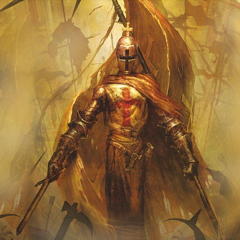…Sit and have a glass of wine while they discuss war, would be the ideal way.
I noted with interest Vox’s last, almost throw-away, comment on his post about my post about Clown World resembling the Paranoia RPG more than the Gamma World RPG.
He ended with:
I never read or played Paranoia, but based on the Kurgan’s description, it does appear that Clown World is headed squarely in that direction, with the exciting addition of a reality-defying demonic element.
As the owner of Uncle John’s Band blog noted about me on SG, I sometimes drive people crazy by noticing what he referred to as single data point patterns. What’s worse, of course, is that I then talk about the extrapolations I get from these and people end up assuming I am either some kind of Magician or seer, or a crazy fantasist that just assumes he’s smarter than everyone else. The truth is that for some people, the ability to do this, extrapolate and understand a whole pattern from what may be a single data point to others, appears perhaps closest to the effects given by the wonder-drug in the film Limitless.
This is not exactly a single data point since I have known about Vox’s tendency to be a strategist rather than a tactician since before 2016, when I had a conversation with him on the phone in some detail.
Anyway, I found his sentence fascinating because it highlights our different modes of operating in the world quite well I think.
So, let me explain, in that semi-autistic, over-detailed way.
Von Clausewitz, in his On War, described essentially four types of men, as relates to the art of war. I forget the other two types (because they were below my station, just as never spent too much time thinking about how many versions of Beta men there were below Alpha and Scout in my own SSH) and I also forget the names Clausewitz gives the top two, but in essence, the General-type is the Strategist and the Commander type is the Tactician.
In my opinion you cannot win a war (at least not well or easily) without both (and a bunch of subordinates and soldiers, of course). If you only have strategists it’s akin to America in Vietnam and Afghanistan. You may have the air superiority, and you may have the technology, and you may have the intelligence, but without knowledge of the details, and dedicated soldiers at the squad level, if the war carries on long enough, you will lose. Even if you “win” you will never really have the “hearts and minds” of the people you are occupying.
If you only have tacticians, you might win almost every small battle, but lose the war politically or logistically or morally.
It is true, that if you have a LOT of tacticians, you can win a war (see Vietnam and Afghanistan, as I said) but it will take years and a huge loss of life and limb.
If you have a good mix of strategists and tacticians, that trust each other and work well together, it becomes really hard to defeat you, even against numerically much superior foes. If you add in a touch of fanaticism, well, you become a real unstoppable force.
Vox’s comment interested me because he brought attention to a strategically very significant issue. He posted a few times about the possibility of AI and computers in general being a possible portal from which demonic spirits may interact more readily with the material world. A case in point is shown below:

Vox noticed this at a strategic level, considering it from that perspective, one might actually do something about it at that level, which might look like blessing specific machines by a valid (sedevacantist) priest prior to use. You could get a whole industry of demon-cleared AI and computers that could give humanity at least an equal footing with the demonic AIs. It is a strategists perspective and it would have a strategist’s solutions, which means, at a relatively bird’s eye view of things.
I have not been unaware of demonic influences, in fact, I am pretty constantly aware of them, but until this comment, I had not given any specific attention to AI or computer-interface with demonic spirits. In my mind, it was just “Eh… more demons. Get the Holy Water infused Flamethrower, keep calm and carry on.”
A Tactician that is good will overcome fantastic odds in battle and be surprising, inventive and hard to predict, while managing men he trusts and relies on who will follow him into the depths of Hell. But he may miss the big picture.
There are notable differences in temperament and moral limits too.
And they may be a little analogous to my discussions on 2D versus 3D thinking.
A strategist has the ability to make alliances and deals with people that a tactician might not even be able to force himself to be civil to in a neutral setting.
I know this is definitely the case with Vox and myself. I recall a conversation we had about Ethan Van Sciver and his behaviour regarding a comic book crowd-funding event and the behaviour Ethan had exhibited. I honestly forget the details as it wasn’t something that affected me directly, but I recall a sense of shock when Vox mentioned he may work with him in the future. The conversation went something like this:
Me: “…why? Why would you ever trust that guy again? Or work with him?!”
Vox: “Who said anything about trust? And why not? If he helps me achieve certain aims?”
Me: “…but… how?”
Vox: “Well, he would never be allowed to have any position where he could control anything, and he’s a good illustrator.”
Me: disapproving silence.
I understand the point, of course, and it makes strategic sense. But personally, the idea of having an unreliable vermin in my ranks, however cordoned off, would disturb my sleep.
In an actual war situation Vox would need to keep such allies far, far, far away from me, for I’d be more liable to slit their throat in darkness, just to be able to rest easy during the carpet bombardments of enemy artillery.
While I would be able to maintain a certain level of decorum at the victory parties after the end of the war, I would not be able to share a table with the allies that behaved in a cowardly fashion, abandoned my men in difficult actions, or chose to somehow put their personal needs before that of their men, even if overall, their contributions would have allowed us to win.
Ultimately the difference between a strategist and a tactician is one of numbers I think, which is why Clausewitz defines them in those terms, that is, the number of men they can direct well at any given time.
My preferred choice is one of course, me. But as I also recognise I have certain abilities, that number can be considerably higher, but always with a need for high trust amongst my men. It is more of a Russian style command structure I favour. The leader is the leader, no questions, but the specialist takes over when it’s his specialty that comes into effect.
Vox is more akin to a general in that he may give a vague aim point, then let the relevant person get on with it as they see fit.
If a strategist is wise enough to direct his tacticians in such a way that they do not overlap with persons, ideologies or obstacles that render them counter-productive, the advances that can be made are astonishing. If you also get some synergy going between the various tacticians, suddenly, the chaos of war begins to take on the form of an amazing, self-creating painting of high art.
And now, of course, I am wondering if I could interest a sede priest to consecrate a specific brand of crusader computers, running Temple OS, in order to fight the demonic hordes of pedophiles at the WEF forum and the Davos and Bilderberge meet-ups, not to mention all the Western Government officials.
You see? As a tactician, I immediately go to the weaponising of tools and practical concerns of sending demons directly back to Hell.
Now Vox just better set up that factory that will produce laptops running Temple OS made in Russia or China by making deals with shady, heavily accented, Russian programmers that chain-smoke unfiltered cigarettes, and fast-talking chinamen without religion.
Tags: strategy, tactics, the kurgan, vox day







